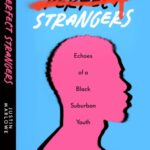WHY MENAH PRATT’S MEMOIR “BLACKWILDGIRL” IS A SYMBOLIC LIBATION

FEATURED AUTHOR: Dr. Menah Pratt
IG: Dr. Menah Pratt
Excerpted from Blackwildgirl: A Writer’s Journey to Take Back Her Superpowers, (c) 2024 by Menah Adeola Eyaside Pratt.
Used with permission of the author.
“I am taking time to create a symbolic libation—a pouring out of gratitude in reverence and remembrance to the women who have inspired this work: Lorraine Hansberry and Leanita McClain, says Pratt
When Mama and I visited Freetown, Sierra Leone,
in West Africa for the first time in 1989, Mama Pratt (my father’s mother) and Aunt Dorothea (my
father’s stepsister from a different mother) took us shortly after our arrival to a seemingly ancient, weed-covered cemetery.
Mama Pratt carried a traditional African meal of jollof rice, chicken, beef, and vegetables in a large brown paper bag. She also had a bottle of rum. Slowly, bending down, moving away
weeds and debris with her old Black worn and weathered fingers, she paused at certain headstones. Brow wrinkled, she turned to Aunt Dorothea to ask her to read the barely visible
name. Hearing it, she slowly shook her head, mumbled in frustration, looked around, and gradually moved to another grave. The process repeated until the name called was the one she’d been listening for. Once the ancestor’s name had been called, Mama Pratt got on her knees in front of the headstone and began a conversation.
The conversation went something like this: “Ancestor, how are you doing? We are here today with Menah, my granddaughter, and her mother, Mildred. This is Ted’s child, my son’s daughter. They are from America. Menah is in college now, a big girl. They have come here to meet you.” She then turned to my mother and me and introduced us to the ancestor: “This is Ancestor So-and-So, your father’s such-and-such. So, they are your such-and-such (great-great-third-cousin-in-law).” My mother and I nodded in respectful acknowledgment, to either her or the ancestor or both.
After the introductions, my grandmother reached into her bag of food, placed some food near the headstone, poured a little liquor near the food in reverence and remembrance, and resumed the conversation: “I ask you to bless them, and help them to be prosperous and healthy.” Silent for a bit,
she mumbled a bit more and poured a little more liquor. A libation. Standing up, she picked up the brown bag of food, grabbed the liquor, and started wandering, pausing, and searching for the next ancestor. For the next hour, she repeated the ritual, confirming the name, making introductions, asking for blessings, and pouring libation. When we finished, she drank the remaining liquor. It wasn’t a lot, but it was as if she was rewarding herself for a job well done. I remember feeling reverence and confusion, all at once. Obviously, a sacred moment, but I didn’t know the ancestors, and I wasn’t sure the ancestors knew me. It was many years later before I could fully appreciate the power, importance, and significance of visiting ancestors at their grave sites.
Five years later, I returned to Sierra Leone alone, without my mother. Again, shortly after my arrival, Mama Pratt, Aunt Dorothea, and I made the ritual cemetery visit. And again, my grandmother walked us around to the grave sites of the ancestors, introduced me to them, asked for their blessing, and left the African meal of jollof rice, chicken, beef, and vegetables. Again, she poured the liquor in front of their graves in reverence and remembrance. A libation.
On that visit, we celebrated Mama Pratt’s eightieth birthday with a big party. Generations of aunts, uncles, cousins, and friends, numbering close to fifty, all showed up to her two-story, always-under-construction apartment building. She lived in the small cluttered downstairs unit with chickens running around,in and out of her house. Around midday, we began to set up a makeshift kitchen in the yard out front. Big pots of stews and soups were placed on top of fire and rocks. Simmering stews, sweating women, and scintillating aromas revealing sacred secrets attested to the culinary expertise of the cooks. Games and storytelling across generations gradually led to a hungry restlessness. Hours later, it was time to eat.
I remember Mama Pratt calling several men and boys to her side. She asked them to dig a large hole. She went to all the pots of food, prayed over them, and asked the sister-cooks to create plates with rice, meat, and vegetables. Not initially satisfied, she often would tell them to add more meat, more vegetables, and more rice from the steaming pots to her plates.
Eventually, she was satisfied, and she went to the large hole. With a bottle of alcohol, kneeling down, she began to talk to the ancestors, mumbling. We couldn’t understand what she was saying, and perhaps we were not meant to. It seemed to be a private conversation between her and those down below.
Reverently, she began to share the meal with the ancestors, spooning and scooping large portions and placing them into the hole, as if she was literally feeding them. As cousins in our teens and twenties standing around, we shared subtle side glances, smirks, and snickers, wondering to ourselves, How much food is this strange old lady going to give to these dead folks? Here we are alive, and we are hungry. We were a little shocked and slightly horrified at how much Mama Pratt seemed to be giving the ancestors. We were too young in the knowings of an African Blackwildwoman to understand why the ancestors deserved so much.
I learned over the years that a libation is so much more than giving ancestors food and drink. It is an act of pouring out gratitude to ancestral energy. It is an act of humility to those who have gone before. It is a call for assistance and protection. It is an act of acknowledgment of the interconnected spirits of those above ground with those on whose ground we are living.
And so, like Mama Pratt, I am taking time to create a symbolic libation—a pouring out of gratitude in reverence and remembrance to the women who have inspired this work: Lorraine Hansberry and Leanita McClain. It is a libation to two Black women who died in their thirties, never fully actual-izing their potential but inspiring and calling on Black women to write as if our lives depended on it—because they do.




